ISSN-e: 2695-2882
DOI: 10.30827/REC
Edições Anteriores
-

Especial SuCCESS
Vol. 10 (2025)Este volumen especial es uno de los frutos del proyecto europeo Erasmus + SuCCESS, que ha creado un consorcio internacional de universidades de Colombia, Perú, Brasil, España y Portugal para la transferencia de conocimiento en criminología. Reúne investigaciones que exploran el impacto del proyecto en la formación criminológica en América Latina y Europa. Se analizan las experiencias educativas en la UFMG tras la implementación del proyecto, así como las necesidades formativas de operadores del sistema penal en Brasil, Colombia y Perú. También se abordan temas como el ciberacoso entre universitarios, el sistema socioeducativo juvenil en distintas regiones de Brasil y una comparación entre las justicias juveniles de Brasil y España. Además, se incluyen reflexiones epistemológicas sobre las ciencias jurídico-penales desde la crenciología, y estudios que proponen enfoques más humanistas y decoloniales en la enseñanza de la criminología.
-
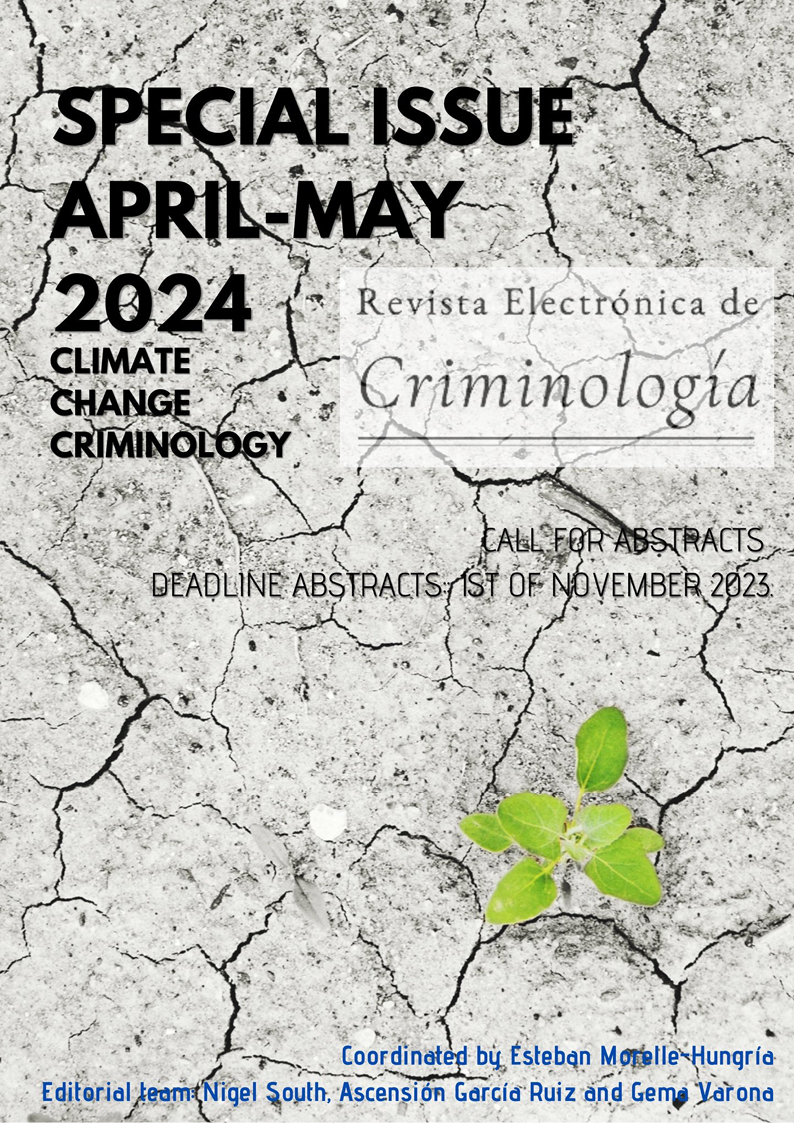
Especial Climate Change Criminology. Coordinado por Esteban Morelle-Hungría. Equipo editorial: Nigel South, Ascensión García Ruiz y Gema Varona
Vol. 9 (2024)En este volumen especial sobre cambio climático y criminología se proponen enfoques innovadores para prevenir crímenes ambientales, combinando criminología crítica, ultra-realismo y eco-teología. También se examina la legislación forestal en México, destacando su énfasis en la regulación comercial más que en la protección ambiental. Se explora el papel de la justicia restaurativa en la rendición de cuentas ambiental y las dificultades para tipificar el ecocidio como delito internacional. Además, se introduce la Astro-Green Criminology, que estudia crímenes ambientales en el espacio, y se advierte sobre el impacto ecológico de Bitcoin. Otros estudios vinculan el ecocidio con el genocidio y analizan la crisis climática en el Ártico como una forma de ecocidio blanco. Finalmente, se reflexiona sobre la interdependencia ambiental y la desigualdad en un mundo afectado por el calentamiento global.
-
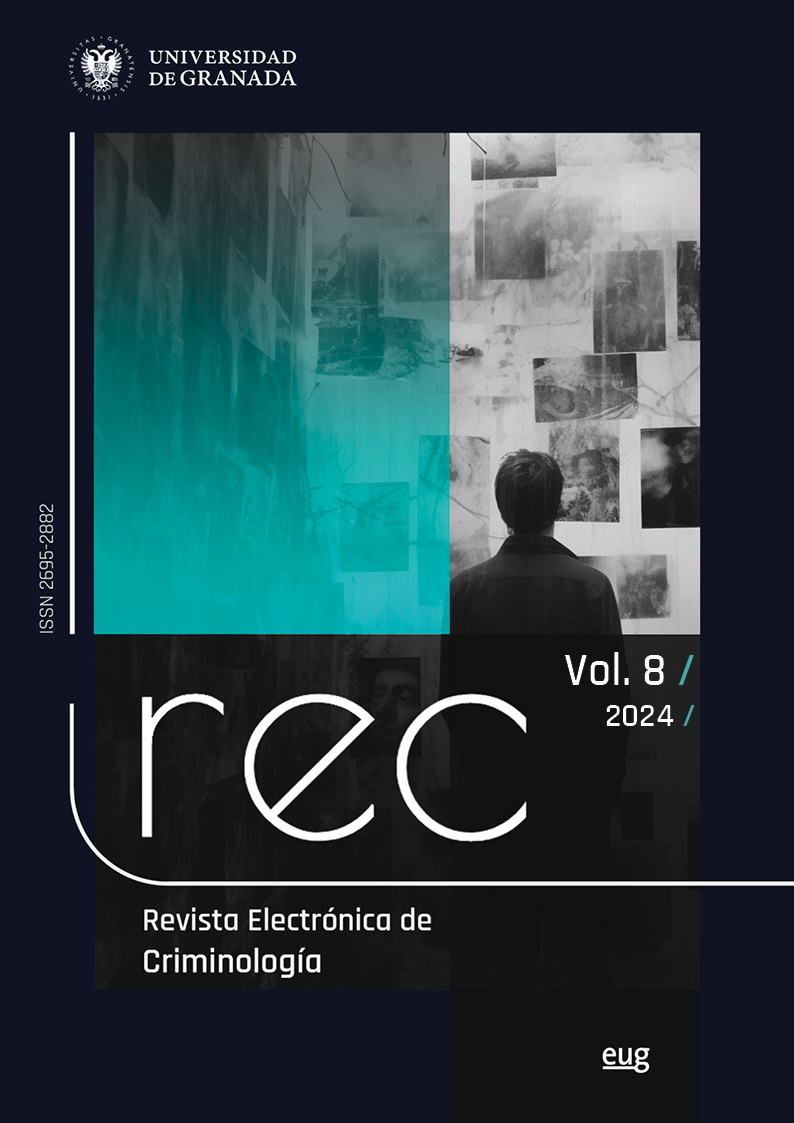
Vol. 8 (2024)
El Volumen 8 (2024) de la Revista Electrónica de Criminología ofrece un enfoque multidisciplinario sobre temas criminológicos clave.
Aborda la falta de reconocimiento institucional de la criminología, la expansión del discurso de odio en el ámbito penal y la eficacia de los protocolos de búsqueda de desaparecidos. También analiza la estructura de grupos armados ilegales, el papel de la fiscalía en delitos económicos y la situación de los menores extranjeros no acompañados, proponiendo estrategias de integración. Además, examina el concepto de femicidio y presenta una recensión sobre derecho penal juvenil.
Este volumen proporciona una visión crítica y actualizada de la criminología contemporánea, combinando enfoques teóricos y aplicados.
-
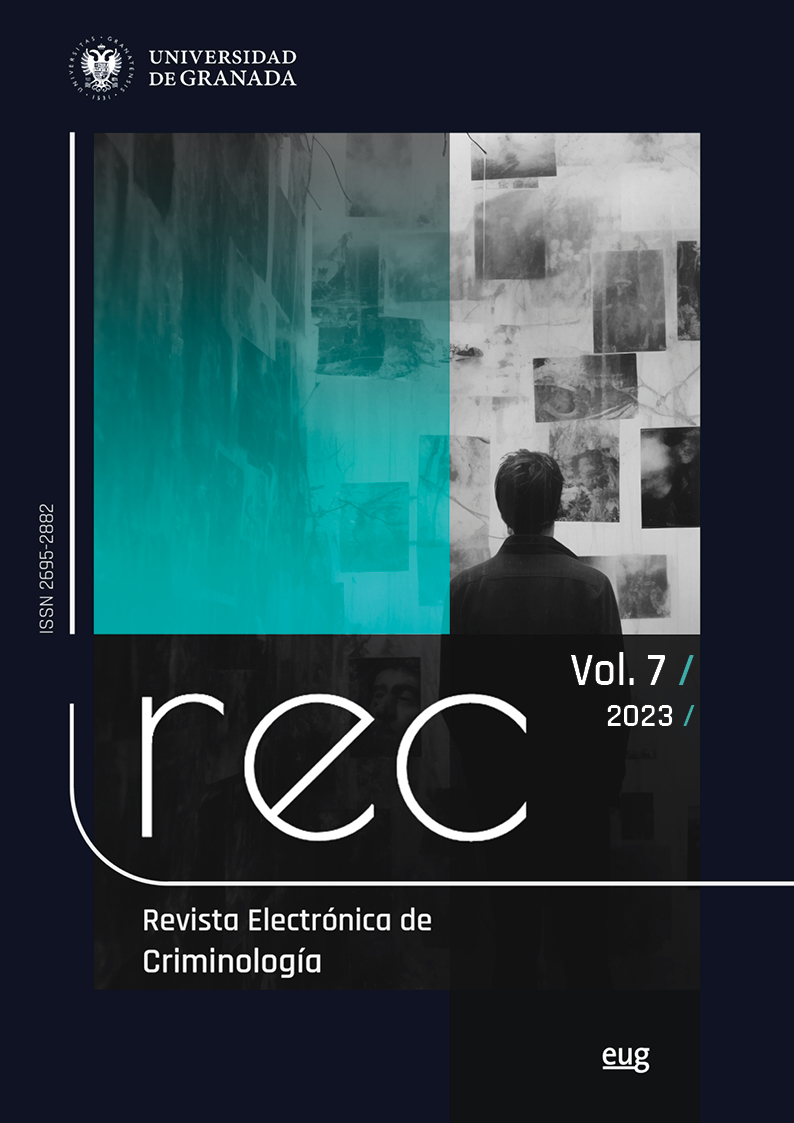
Vol. 7 (2023)
El volumen 7 (2023)de la Revista Electrónica de Criminología presenta 16 artículos que abordan diversos temas en criminología, seguridad y justicia.
Se examinan la percepción de seguridad en España, el impacto de la disuasión en el consumo de cannabis y el desplazamiento del narcotráfico en Madrid. También se analizan patrones delictivos en Buenos Aires y la demora en los procesos judiciales por homicidio. Desde una perspectiva psicológica y criminológica, se estudia la hibristofilia y el desistimiento delictivo. Otros artículos abordan la criminalización de refugiados en la UE, la intervención de la Policía Militar en delitos flagrantes y la ciberseguridad para no expertos. Además, se evalúa la efectividad de programas de intervención en violencia de género.
Este volumen ofrece un enfoque integral y actualizado sobre la criminología, combinando estudios teóricos y empíricos en justicia, seguridad y prevención del delito.
-
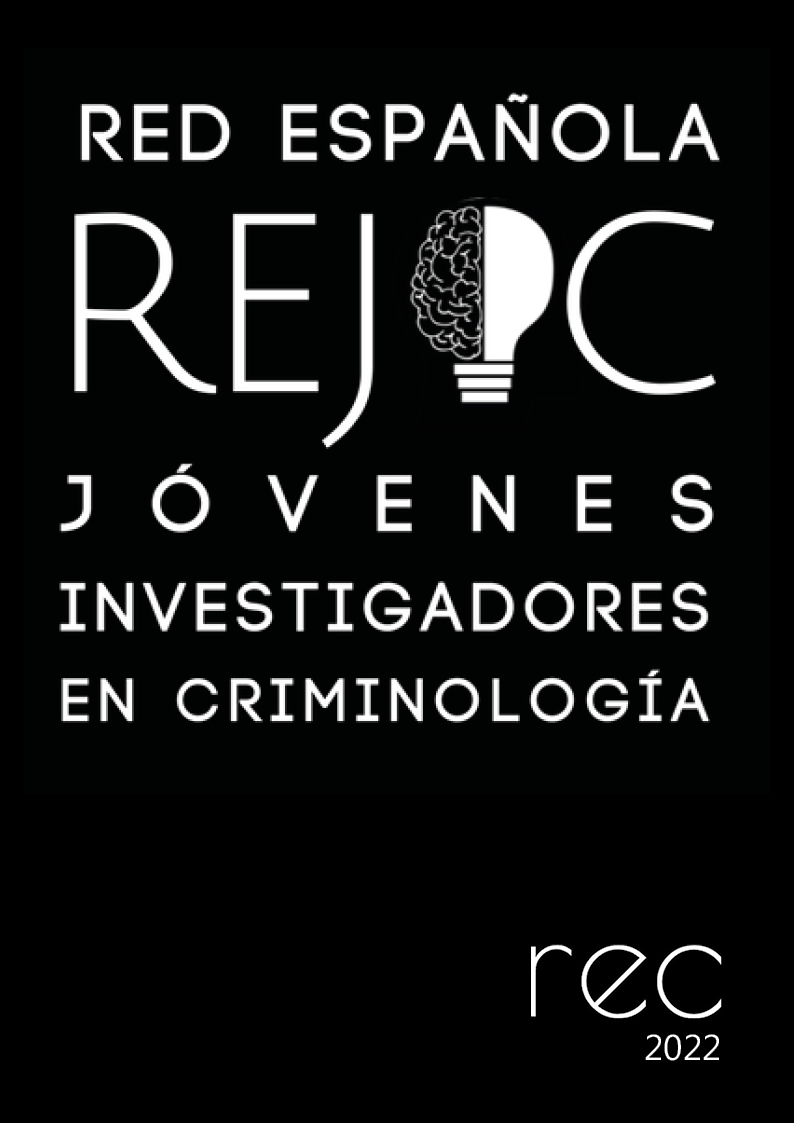
REJIC. Comité editor de la edición especial: Elena Casado, Cristina Domingo y Patricia Saldaña
Vol. 6 (2022)Este volumen especial surge en colaboración con la REJIC y cuenta con artículos de jóvenes investigadores en nuestro campo de una gran variedad de temáticas y enfoques. Se analiza el estado de la Policía Local en la Comunidad Valenciana, destacando carencias en recursos y coordinación. También se estudia el papel de las mujeres en el terrorismo yihadista, alejándose de estereotipos de género, y la criminalidad juvenil a través del análisis de mujeres condenadas por homicidio. Otro trabajo examina las notificaciones de maltrato infantil, revelando diferencias en la detección según el género de la víctima y el ámbito de denuncia.
La prevención del delito se explora mediante tecnologías digitales basadas en la participación ciudadana, mientras que un estudio sobre cibercrimen en videojuegos analiza los factores que precipitan o controlan conductas delictivas en línea. Además, se investiga la predicción de manifestaciones en España utilizando modelos de series temporales. Finalmente, se reflexiona sobre la importancia de la divulgación de la criminología joven, especialmente en tiempos de pandemia, para fortalecer la red científica.
-
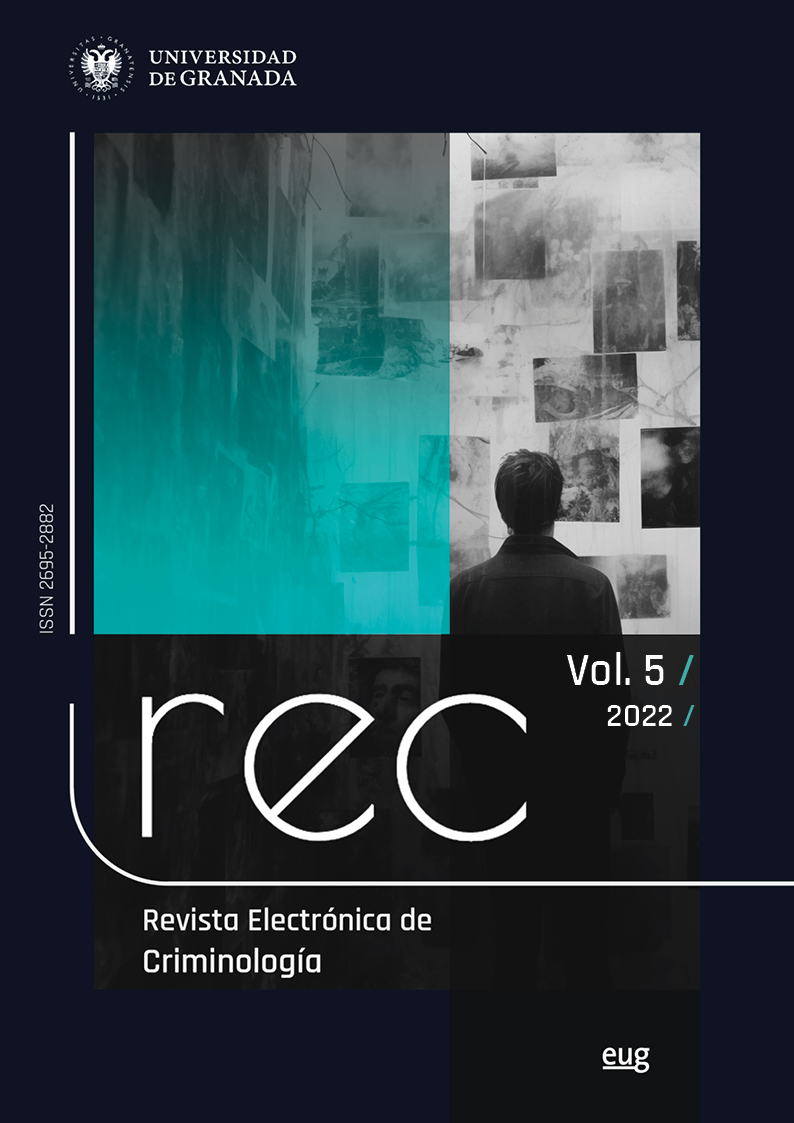
Vol. 5 (2022)
El Volumen 5 (2022) de la REC incluye artículos de investigación y recensiones de libros. Los artículos abordan temas como la búsqueda familiar de largo alcance para identificar sospechosos mediante ADN, el impacto de las ordenanzas municipales en la regulación de la prostitución y los efectos de la acidificación del Mediterráneo en la Posidonia oceánica, evaluando su impacto ecológico.
Las recensiones, en cambio, analizan obras recientes en criminología y derecho penal. El Tratado Sobre Delincuencia Juvenil y Responsabilidad Penal del Menor, que reúne aportes de especialistas en justicia juvenil, y El Derecho Penal ante lo empírico, que resalta la importancia de los datos empíricos en las políticas criminales. Estas evaluaciones críticas permiten una mejor comprensión de nuevas contribuciones en la disciplina.
-
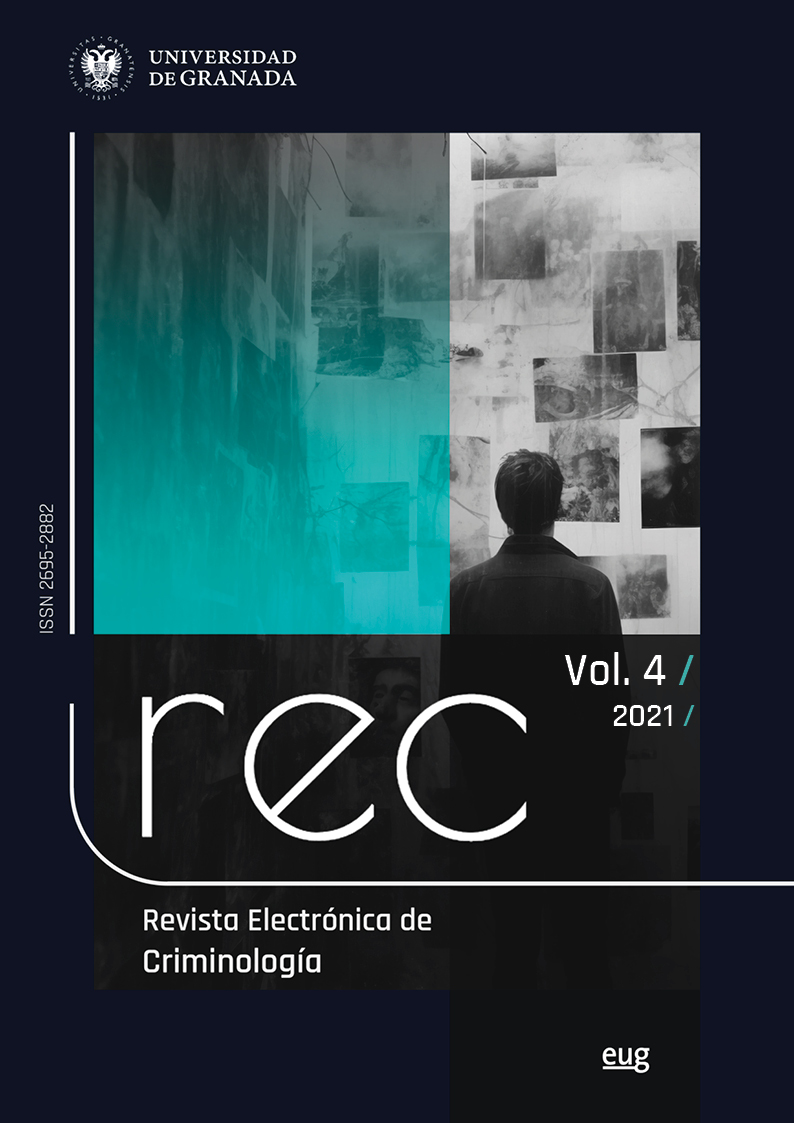
Vol. 4 (2021)
El Volumen 4 (2021) de la Revista Electrónica de Criminología (REC) presenta una serie de artículos que abordan diversas temáticas en el ámbito criminológico. Uno de los estudios se centra en la predicción de las tasas de encarcelamiento en España, utilizando modelos ARIMA para analizar datos desde 1971 hasta 2020 y ofrecer proyecciones para el período 2021-2023. Otro artículo aplica el Protocolo de Valoración del Riesgo en Adolescentes Infractores (VRAI) en un caso práctico, demostrando su utilidad para sistematizar la evaluación y planificación terapéutica en menores con medidas judiciales. Además, se realiza un análisis de las resoluciones absolutorias en delitos contra el medio ambiente entre 2009 y 2019, enfocándose en los artículos 325 y 334 del Código Penal, para identificar las causas comunes de absolución en estos casos.
-
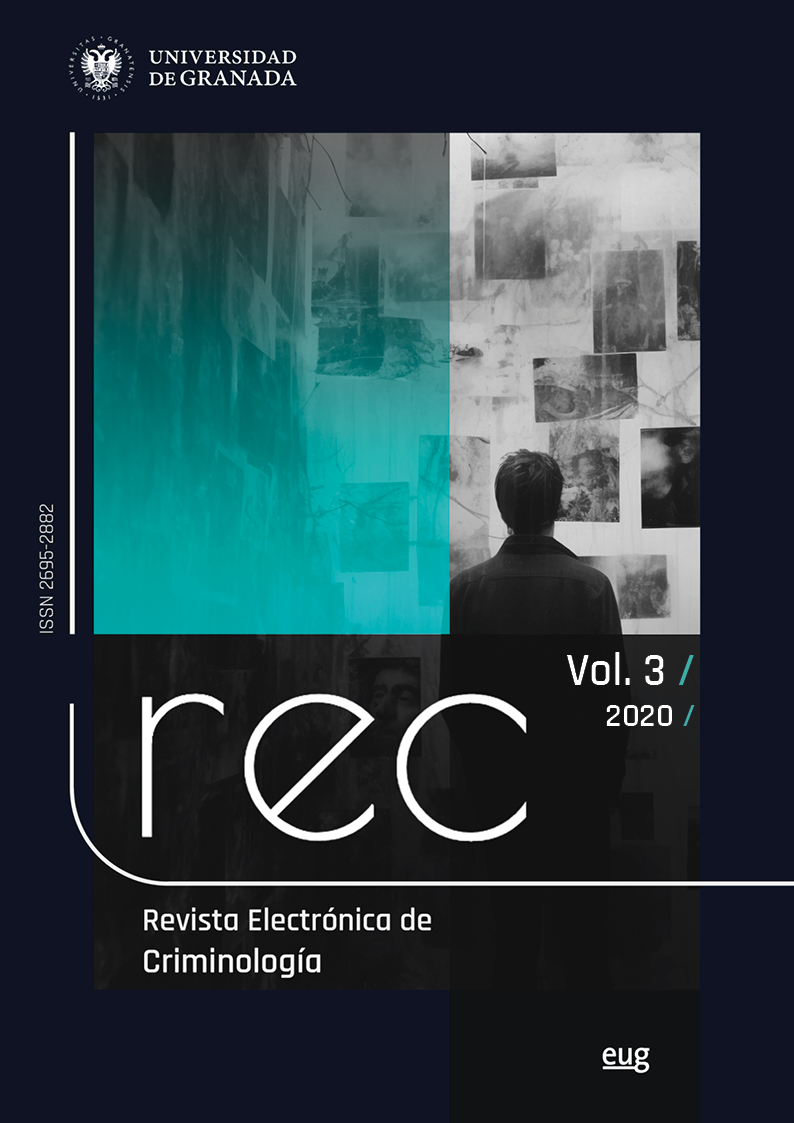
Vol. 3 (2020)
El Volumen 3 (2020) de la Revista Electrónica de Criminología (REC) aborda diversas temáticas en criminología. Un artículo examina la evolución del estudio de la inseguridad ciudadana en España, señalando la escasez de investigaciones en el contexto nacional. Otro texto analiza la ecocriminología como una perspectiva integral que vincula criminología y ecología para abordar problemáticas ambientales. También se estudia la relación entre redes sociales y conductas de riesgo, explorando el fenómeno del erostratismo digital en plataformas como Instagram.
Otros trabajos investigan la criminalidad juvenil, como un análisis de las técnicas de neutralización utilizadas por menores agresores sexuales. También se examina la respuesta del sistema de justicia penal ante la violencia de género, identificando fallos que generan victimización secundaria. Finalmente, un estudio sobre terrorismo yihadista en Occidente analiza factores de riesgo en la comisión de atentados, basándose en el estudio de casos ocurridos desde 2006.
-
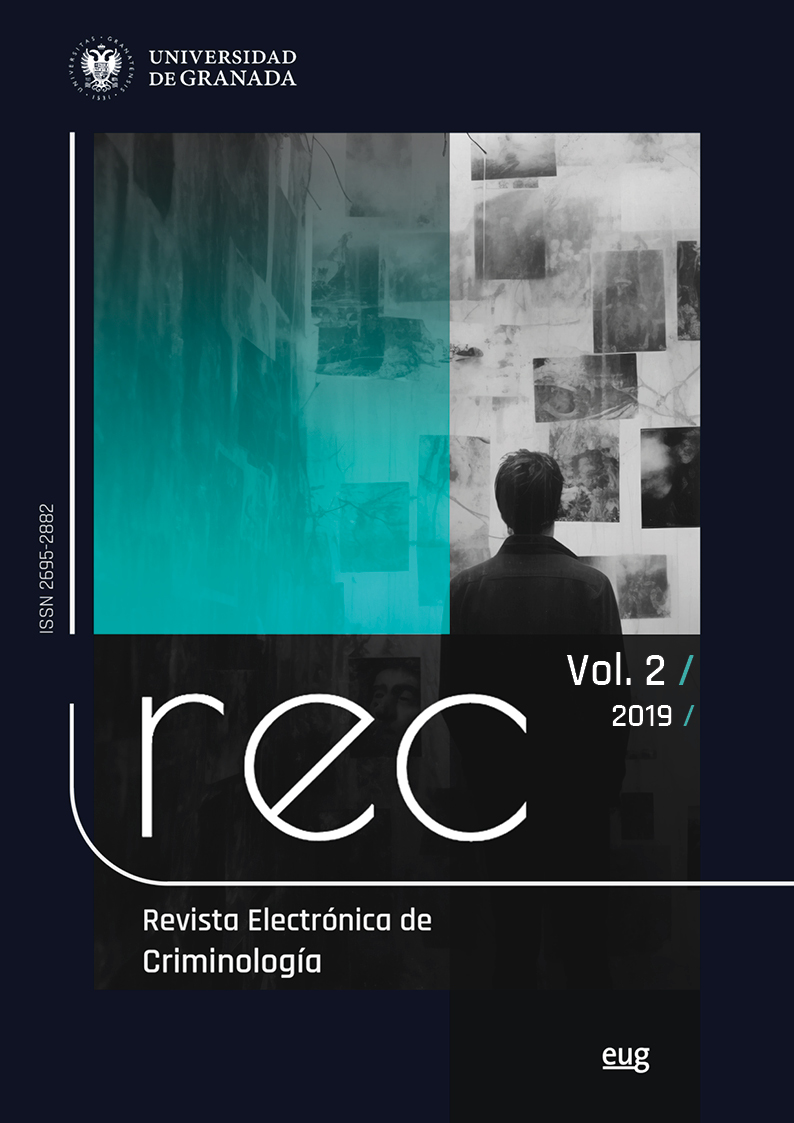
Vol. 2 (2019)
El Volumen 2 (diciembre, 2019) de la Revista Electrónica de Criminología (REC) presenta artículos sobre criminología y justicia penal. Se incluye la traducción del artículo de Peter Grabosky sobre ciberdelincuencia, destacando la continuidad entre los delitos en Internet y los tradicionales. También se analiza la tipología de asesinos en masa y múltiples en un solo acto en España, identificando patrones comunes. Otro estudio examina los límites del secreto profesional en instituciones penitenciarias y el dilema entre confidencialidad y obligación de informar sobre delitos.
Además, se ofrece una revisión sistemática sobre el cumplimiento de la propiedad intelectual y sus diferencias de género, así como un análisis de sentencias sobre abuso sexual infantil, evaluando la protección del menor en el proceso judicial. Estos estudios abordan temas clave desde una perspectiva empírica y normativa, contribuyendo al debate criminológico y jurídico.
-
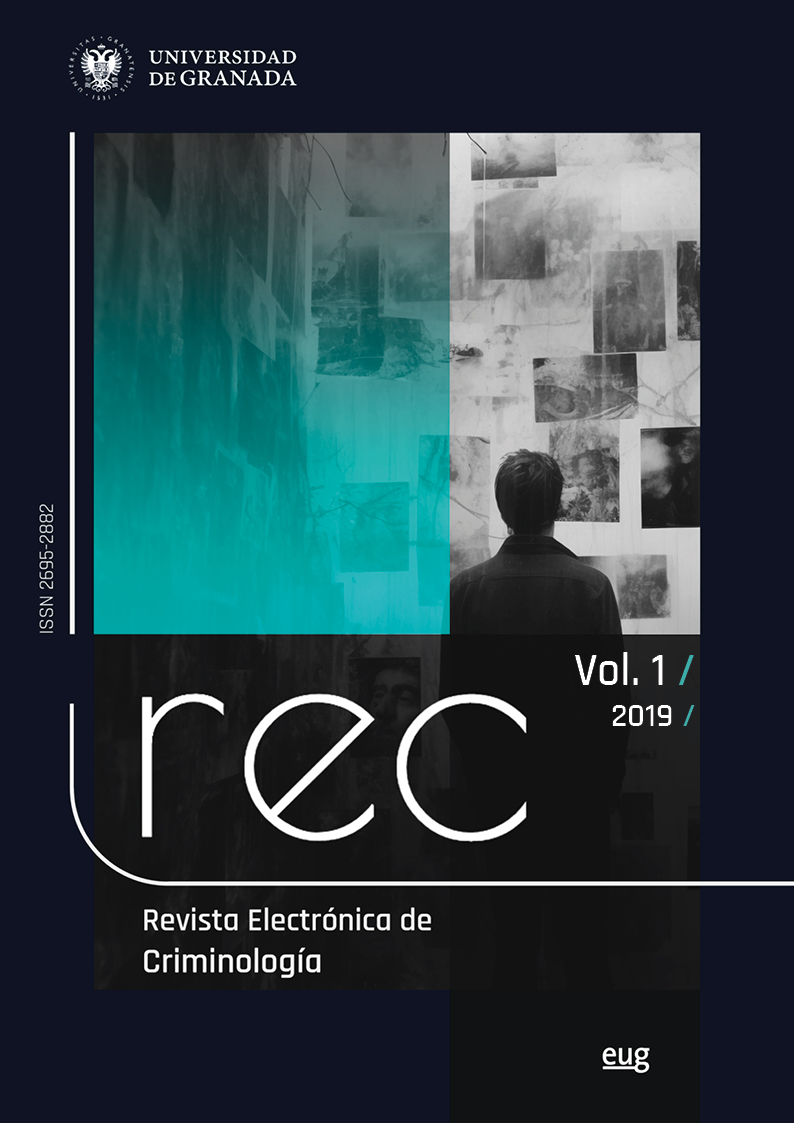
Vol. 1 (2019)
El Volumen 1 (agosto, 2019) de la Revista Electrónica de Criminología (REC) hace su debut con estudios sobre diversas temáticas criminológicas. Se analizan las actitudes punitivas de los ciudadanos en relación con la prisión permanente revisable, la utilidad de la odorología forense en la identificación de sospechosos mediante perros entrenados y los efectos indirectos de la frustración sobre la desviación en el ámbito deportivo. También se examina un instrumento criminológico, los informes de situación delictiva (ISD), útil para la realización de programas estratégicos en políticas públicas de seguridad ciudadana. El volumen cierra con una recensión sobre el libro de Esther Fernández Molina y Mª José Bernuz Beneitez, Justicia de menores.
Estos artículos combinan enfoques empíricos y teóricos para aportar conocimiento actualizado sobre la criminología y el derecho penal. La revista busca consolidarse como un espacio de difusión científica que fomente el debate y el desarrollo de la disciplina en el ámbito hispanohablante.












